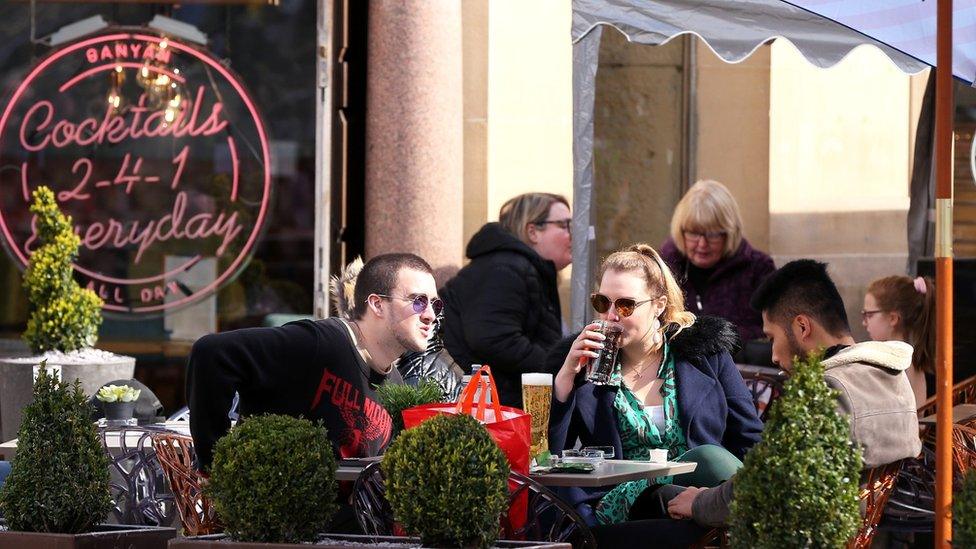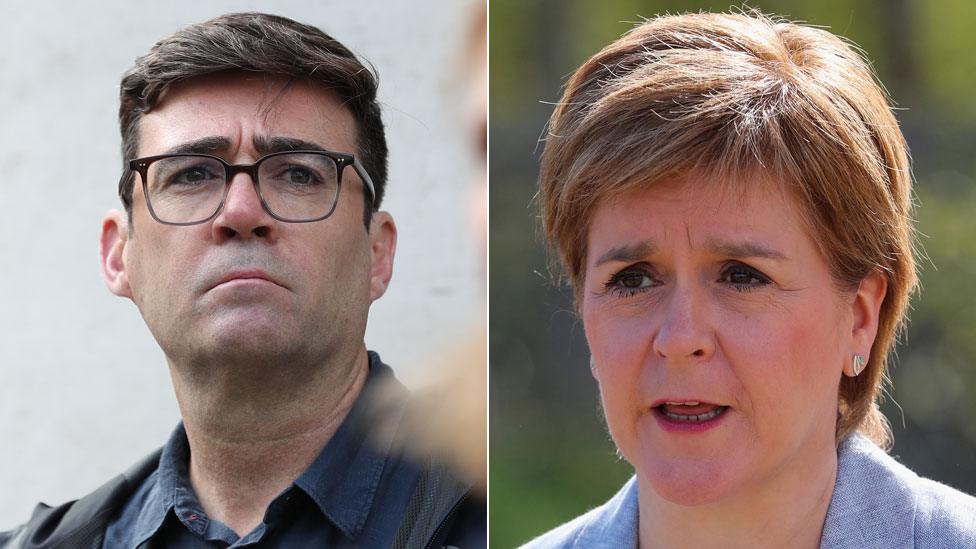Scottish government lifts Manchester travel ban
- Published
- comments

The Scottish government is to lift its ban on non-essential travel between Scotland and parts of north-west England, including Manchester.
The restriction sparked a row between First Minister Nicola Sturgeon and Greater Manchester Mayor Andy Burnham.
Mr Burnham accused Ms Sturgeon of "hypocrisy" for imposing the ban without any consultation with him.
He also pointed out that parts of Scotland had higher Covid rates than Manchester.
The ban on travel between Scotland - which currently has the highest Covid rate, external of any UK nation - and Manchester came into force on 21 June.
However, Health Secretary Humza Yousaf said the measure - and a similar ban on travel to and from Bolton that was announced in May - is to be lifted from midnight on Tuesday after a "careful review of the data".
A ban on non-essential travel to the Blackburn with Darwen local authority area will remain in place for at least another week.
Mr Burnham had accused Ms Sturgeon of "hypocrisy" over the "completely disproportionate" ban, saying she had failed to engage with concerns about it.
He also threatened legal action on behalf of individuals and businesses who were affected.
Ms Sturgeon said she was "a bit confused" over the mayor's stance, and suggested his statements were "part of some position in a Labour leadership contest of the future".

Find out how the pandemic has affected your area and how it compares with the national average:

Covid infection numbers have hit a series of new record highs in Scotland over the past week, with more than 3,200 cases being reported on Monday - the highest since the pandemic began.
Scottish government scientists say infections could hit 100,000 per week by mid-July in a worst-case scenario.
But Mr Yousaf said there were no plans for additional restrictions to be imposed, with the vaccine programme weakening the link between cases and serious illness.
He also insisted the government would "never allow" the number of weekly cases to hit 100,000.

Andy Burnham and Nicola Sturgeon have clashed over the travel ban
Announcing the lifting of the travel restrictions, the health secretary said nobody wanted them to be in place any longer than "absolutely necessary".
He said: "Placing restrictions on travel between Scotland and parts of north west England was only taken after extremely careful consideration and analysis of data to help prevent the spread of variants of concern.
"Following a careful review of the data we have decided to ease travel arrangements between Scotland and Manchester, Salford and Bolton.
"However, the situation regarding Blackburn and Darwen will need to be closely monitored and will be reviewed again in a week's time."
Mr Burnham said he had serious concerns about the ban being imposed - but was "grateful to the first minister and to the Scottish government for listening, and for the decision they have announced today".
Ms Sturgeon later told a Scottish government Covid briefing that there were two factors in particular which could be behind Scotland's high case rate, beyond temporary causes such as fans travelling to London to watch the Scotland football team earlier this month.
She said: "The Delta variant in England seeded into Bolton first of all. In an English context size-wise Bolton is relatively small.
"In Scotland the delta variant first seeded in Glasgow, which is our biggest city, so accounts for a much bigger part of our population - so therefore the Delta variant was possibly able to spread more quickly and more extensively than in England in that early phase."
"We have, by around 8 to 10 percent, lower population immunity in Scotland than in England and Wales, which may be reflective of the fact fewer of us had the virus in earlier stages.
"What that means, while vaccination will be evening this out on a day by day basis, is that right now we have a slightly bigger susceptible population".


Related topics
- Published24 June 2021

